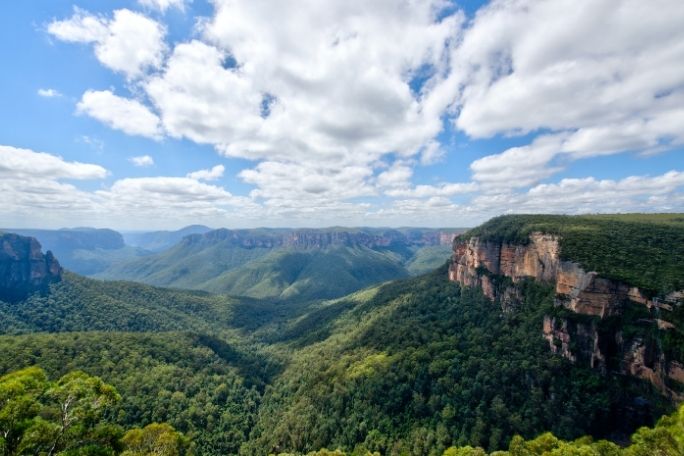Lesson summary
Students explore how nature makes them feel, the Australian places in nature that they love, and how these places might be affected by climate change. Students begin this lesson by participating in a mindfulness walk through nature, observing their responses to nature. They are then asked to look at and compare holiday photos of their parents/caregivers with pictures of places they love, discussing the reasons why these places are special and speculating on how these places may have changed over time. Students will then look at a range of other images of special places in Australia, and investigate how climate change might affect the place they love and their experience of it. Finally, students will write an article to describe the place they love, how it will be affected by climate change, and why people should participate in Earth Hour this year. Note: Year 7 students will look at Australian places with water that they love; Year 8 students will look at Australian landscapes that they love.
Essential questions:
- How do we value our environment?
- How do people’s reliance on places and environments influence their perception of them?
- How do environmental and human processes affect the characteristics of places and environments?
- What are the consequences of changes to places and environments and how can these changes be managed?
Lesson guides and printables
Lesson details
Curriculum mapping
Australian Curriculum content descriptions:
Year 7 Geography:
- Economic, cultural, spiritual and aesthetic value of water for people, including Aboriginal and Torres Strait Islander Peoples and peoples of the Asia region (ACHGK041)
- Reflect on their learning to propose individual and collective action in response to a contemporary geographical challenge, taking account of environmental, economic and social considerations, and predict the expected outcomes of their proposal (ACHGS054)
Year 7 English:
- Plan, draft and publish imaginative, informative and persuasive texts, selecting aspects of subject matter and particular language, visual, and audio features to convey information and ideas (ACELY1725)
Year 8 Geography:
- Spiritual, aesthetic and cultural value of landscapes and landforms for people, including Aboriginal and Torres Strait Islander Peoples (ACHGK049)
- Reflect on their learning to propose individual and collective action in response to a contemporary geographical challenge, taking account of environmental, economic and social considerations, and predict the expected outcomes of their proposal (ACHGS062)
Year 8 English:
- Create imaginative, informative and persuasive texts that raise issues, report events and advance opinions, using deliberate language and textual choices, and including digital elements as appropriate (ACELY1736)
General capabilities: Literacy, Critical and Creative Thinking, Personal and Social Capability.
Cross-curriculum priority: Sustainability OI.6, OI.7, OI.9.
Relevant parts of Year 7 Geography achievement standards:
Students explain interconnections between people and places and environments and describe alternative strategies to a geographical challenge referring to environmental, economic and social factors.
Relevant parts of Year 7 English achievement standards:
Students create structured and coherent texts for a range of purposes and audiences, and make presentations and contribute actively to class and group discussions.
Relevant parts of Year 8 Geography achievement standards:
Students explain interconnections between people and places and environments and describe alternative strategies to a geographical challenge referring to environmental, economic and social factors.
Relevant parts of Year 8 English achievement standards:
Students create texts for different purposes, selecting language to influence audience response, and make presentations and contribute actively to class and group discussions.
Syllabus Outcomes: GE4-4, GE4-1, GE4-8.
Unit of work: Earth Hour – Secondary.
Time required: 60 mins x 2.
Level of teacher scaffolding: Medium – oversee activities and facilitate discussions.
Resources required
- Student Worksheet – one copy per student OR computers/tablets to access the online worksheet
- Device capable of presenting a website to the class
- One copy of Rake worksheet for each student
- Earth Hour – Place We Love – Images. Article Writing Tips. Article Assessment Rubric.
Skills
This lesson is designed to build students’ competencies in the following skills:
- Critical thinking
- Communication
- Creativity
- Social Skills
- Community engagement
- Problem solving
- Global citizenship
Additional info
This lesson has been created in partnership with WWF-Australia. Earth Hour is the world’s largest community-driven climate change campaign. At the centre of Earth Hour is switching off lights to show a commitment to taking action.
Thousands of teachers use Earth Hour’s education program to enrich their curriculum and provide pathways for young people to create change in their world.
For the most up to date Earth Hour dates, times, and events, check here.


Welcome back!
Don't have an account yet?
Log in with:
By signing up to Cool.org you consent and agree to Cool's privacy policy to
store, manage and process your personal information. To read more, please see
our privacy policy here(Opens in new tab).
Create your free Cool.org account.
Many of our resources are free, with an option to upgrade to Cool+ for premium content.
Already have an account?
Sign up with:
By signing up to Cool.org you consent and agree to Cool's privacy policy to
store, manage and process your personal information. To read more, please see
our privacy policy here(Opens in new tab).